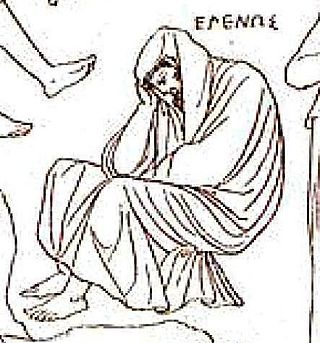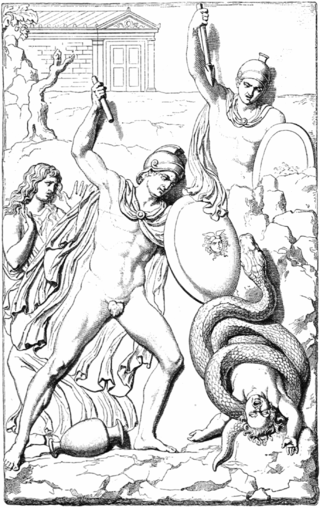Related Research Articles
There were several figures named Elatus or Élatos in Greek mythology.

In Greek mythology, Helenus was a gentle and clever seer. He was also a Trojan prince as the son of King Priam and Queen Hecuba of Troy, and the twin brother of the prophetess Cassandra.
In Greek mythology, the name Laodamia referred to:

In Greek mythology, Polymestor or Polymnestor was a king of the Bistonians in Thrace. Polymestor appears in Euripides' play Hecuba and in the Ovidian myth "Hecuba, Polyxena and Polydorus". Polymestor was also the name of a Greek king of Arcadia.
In Greek mythology, Polydorus or Polydoros referred to several different people.
In Greek mythology, Euneus was a son of Jason and Queen Hypsipyle of Lemnos; he had a twin brother whose name is variously given as Nebrophonus, Thoas or Deipylus.

In Greek mythology, Hypsipyle was a queen of Lemnos, and the daughter of King Thoas of Lemnos, and the granddaughter of Dionysus and Ariadne. When the women of Lemnos killed all the males on the island, Hypsipyle saved her father Thoas. She ruled Lemnos when the Argonauts visited the island, and had two sons by Jason, the leader of the Argonauts. Later the women of Lemnos discovered that Thoas had been saved by Hypsipyle and she was sold as a slave to Lycurgus, the king of Nemea, where she became the nurse of the king's infant son Opheltes, who was killed by a serpent while in her care. She is eventually freed from her servitude by her sons.
In Greek mythology, Ilione or Iliona was a Trojan princess who later became a queen of Thrace. She is briefly mentioned in Virgil's Aeneid: Aeneas gives her scepter to Dido.
Actor is a very common name in Greek mythology. Here is a selection of characters that share this name :
Lycus is the name of multiple people in Greek mythology:

In Greek mythology, Opheltes, also called Archemorus, was a son of Lycurgus of Nemea. His mother is variously given as Eurydice, Nemea, or Amphithea. As an infant, he was killed by a serpent at Nemea. Funeral games were held in the boy's honor, and these were supposed to have been the origin of the Nemean Games.

In Greek mythology, Thoas was a son of the god Dionysus and Ariadne, the daughter of the Cretan king Minos. He was the king of Lemnos when the Lemnian women decided to kill all the men on the island. He was the only man to survive the massacre, having been saved by his daughter Hypsipyle. He is sometimes identified with the Thoas who was the king of the Taurians when Iphigenia was taken to the land of the Taurians and became a priestess of Artemis there.
In Greek mythology, Chromius was the name of the following characters.

Polydorus or Polydoros is the youngest son of Priam in the mythology of the Trojan War. While Homer states his mother is Laothoe, later sources state his mother is Hecuba. Polydorus is an example of the fluid nature of myth, as his role and story vary significantly in different traditions and sources.
Chryses was the name that may refer to one of the following figures in Greek mythology:
In Greek mythology, Hippodamas may refer to the following characters:

In Greek mythology, Thoas was a king of the Taurians, a barbaric tribe in Crimea. He was king when Agamemnon's daughter Iphigenia was taken to the land of the Taurians, and became a priestess of Artemis there. He was a character in Euripides' play Iphigenia among the Taurians. He is sometimes identified with the Thoas who was the king of Lemnos and the son of Dionysus and Ariadne, and the father of Hypsipyle.
In Greek mythology, Thoas was a son of Jason and Hypsipyle, and a grandson of the Lemnian king Thoas, and the twin brother of Euneus. Thoas and Euneus took part in the funeral games of the Nemean king Lycurgus' infant son Opheltes, after which they succeeded in rescuing their mother Hypsipyle from her servitude.
In Greek mythology, Palaemon or Palaimon may refer to the following personages:
In Greek mythology, Nebrophonus may refer to a person and a canine:
References
- Apollodorus, The Library with an English Translation by Sir James George Frazer, F.B.A., F.R.S. in 2 Volumes, Cambridge, MA, Harvard University Press; London, William Heinemann Ltd. 1921. ISBN 0-674-99135-4. Online version at the Perseus Digital Library. Greek text available from the same website.
- Gaius Julius Hyginus, Fabulae from The Myths of Hyginus translated and edited by Mary Grant. University of Kansas Publications in Humanistic Studies. Online version at the Topos Text Project.
- Publius Ovidius Naso, The Epistles of Ovid. London. J. Nunn, Great-Queen-Street; R. Priestly, 143, High-Holborn; R. Lea, Greek-Street, Soho; and J. Rodwell, New-Bond-Street. 1813. Online version at the Perseus Digital Library.